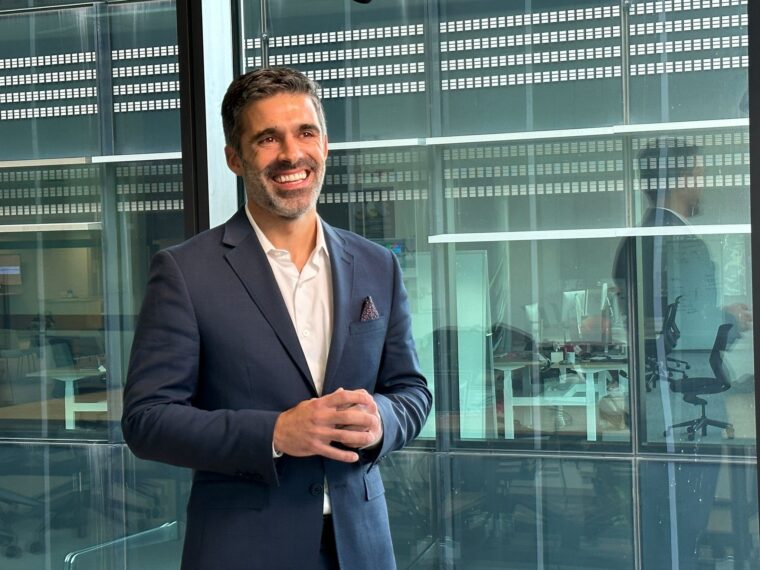As part of the partnership between the Portuguese Diaspora Council and Jornal de Negócios, Octávio Simões, Advisor in the Energy sector, and Counselor of the USA Regional Hub, was interviewed by Jornal de Negócios. In the interview, Octávio Simões discussed his professional journey and identified competitive opportunities for Portugal, its economy, companies, and entrepreneurs in general.
1 – WHAT LED YOU TO LEAVE PORTUGAL?
I left Portugal in 1977 to go to university. When I finished high school in 1976, I spent a year doing civic service — which basically meant doing nothing, as everything was very disorganized at the time. I left to study engineering in a country that was in a more stable situation than Portugal, intending to return after completing my degree. But I fell in love with the country, with the opportunities, with the openness — and I’ve stayed ever since. It’s been 47 years now.
2 – WHAT ADVANTAGES OR DISADVANTAGES HAS THE FACT THAT YOU ARE PORTUGUESE BROUGHT YOU?
Being Portuguese abroad inspires an attitude of always finding a way to solve things, never discarding any option — an open-mindedness towards all cultures, and a deep desire to succeed while feeling proud of being Portuguese. Although English is not my first language, I soon discovered that I had an advantage in business meetings: I paid attention above all to body language. Later, as my career became increasingly international, working with partners who were not fluent in English, I developed a strong ability to truly understand their intentions. Moreover, the Portuguese are not seen as a threatening people or as having a sense of superiority, which has always made personal contact easy and natural.
3- WHAT OBSTACLES DID YOU HAVE TO OVERCOME AND HOW DID YOU DO IT?
Studying in the United States was financially very difficult, as my parents were not allowed to send foreign currency in the late 1970s due to government restrictions at the time. As a result, I had to pay for my studies and living expenses myself through various jobs. By taking on every opportunity I could find, I ended up developing skills I would never have gained at university — such as selling ideas and products, entrepreneurial initiative, learning to “take” the word “no,” and the willingness to take risks.
4 – WHAT DO YOU MOST ADMIRE ABOUT THE COUNTRY YOU ARE CURRENTLY IN?
Until recently, the United States had a culture of merit, hard work to achieve goals, and a celebration of success regardless of one’s field. There were very few barriers to obtaining credit, and government services were always there to help. This environment pushed us to constantly strive for more. It was a powerful catalyst for me, encouraging every initiative and idea that came to mind. It was a culture where nothing seemed impossible.
Unfortunately, for those who live outside the U.S., there is often a mistaken perception of the American people and of how their government and society actually function — perhaps influenced by the image portrayed by Hollywood or by a casual visit to New York or Los Angeles. It’s a pity, because the generosity and openness of Americans are truly captivating, and I’ve always appreciated their lack of ceremonial protocol in personal interactions and in the use of titles.
5 – WHAT DO YOU ADMIRE MOST ABOUT THE COMPANY / ORGANIZATION YOU ARE IN?
Over the past twelve years, as CEO of two companies engaged in a global energy business, I’ve had the opportunity to work all over the world in a field that is critical to the prosperity and well-being of people everywhere. Taking an active role in building pragmatic solutions to improve living standards, eliminate energy poverty, and provide future generations with access to the energy they need to escape an unacceptable deficit in quality of life has been the driving force that inspired me to work harder every single day. Being able to combine passion with intellect is a formula I wholeheartedly recommend to everyone. Both professionally and personally, I couldn’t have asked for more — it has been an immensely rewarding journey.
6 – WHAT RECOMMENDATIONS DO YOU HAVE FOR PORTUGAL, ITS ENTREPRENEURS AND MANAGERS?
Being part of the European Union brings many benefits, but it also “ties” Portugal to a European culture that, in my view, is somewhat disconnected from the realities of the rest of the world. By 2050, demographic projections show that the regions leading global development and growth will not include Europe. Portugal, however, has the historical and cultural capacity to look more toward Asia and Africa and to play a significant role in fostering and supporting the development of those regions—while at the same time creating vast opportunities for Portuguese companies.
I would also recommend that the management and operational models of Portuguese companies move toward less protocol, greater openness to new ideas, a flatter organizational structure with real delegation of authority and decision-making, and an unwavering commitment to eliminating counterproductive government regulations and tax structures.
7 – IN WHICH SECTORS OF THE COUNTRY WHERE YOU LIVE CAN PORTUGUESE COMPANIES FIND CUSTOMERS?
First, Portugal needs to identify the sectors and products that have the capacity to serve a market of 350 million people. Which industries and activities are capable of producing on a large scale? Then, it’s a matter of creating something truly distinctive.
Over the years, I have watched with some concern that Portugal, in general, has not made a significant effort to identify its strengths and then plan and provide support so that certain industries and activities can grow, become more efficient, and increase productivity. For example, our wines hold a very interesting place in the global market, but they could be far better known and respected — Port wine being the exception. Our ceramics and other manufacturing industries could also have a much greater impact internationally if they achieved larger scale.
Portugal has some fantastic products, but we have not managed to create the image necessary for these products to reach the sales levels they deserve based on their quality. These are just a few examples — but there are many more.
8 – IN WHICH SECTORS IN PORTUGAL COULD COMPANIES IN THE COUNTRY WHERE YOU ARE WANT TO INVEST?
Investing in Portugal is challenging due to the small size of the market. Logistical and bureaucratic difficulties add to the problem, and certain aspects of labor regulation are not attractive to investors. In the tourism and real estate sectors, investment is currently happening on a regular basis. However, at the industrial level, I believe there would be many opportunities if Portugal were more open to foreign investment and more competitive in its labor market.
Essentially, Portugal needs to offer stability on several fronts so that investment can be made with a reasonable sense of security — something that has not always been the case. It’s worth noting that countries able to create such conditions tend to attract investment with relative ease.
9 – WHAT IS THE COMPETITIVE ADVANTAGE OF THE COUNTRY YOU ARE IN THAT COULD BE REPLICATED IN PORTUGAL?
There are several advantages that Portugal needs to create. Among them, I would highlight an open labor market without restrictions on mobility, a tax system that encourages investment by small and medium-sized enterprises, and a culture that celebrates success. The number of small businesses formed each year in the U.S. is enormous, and many of them are not successful. But the environment is such that new opportunities continuously emerge. This constant fluidity and mobility, supported by easy access to bank credit and the fiscal structure, is the “lifeblood” of the country.
Seventy percent of businesses in the U.S. are small enterprises, many of them run by a single owner-operator — for example, a plumber or electrician. Working independently is the goal, even with the insecurity that entails. This culture represents a huge competitive advantage.
10 – ARE YOU THINKING OF RETURNING TO PORTUGAL? WHY?
Throughout my career, I tried to develop several projects in Portugal, unfortunately without success. The projects were relatively small compared to what I was doing in other parts of the world, but the nostalgia of doing something in Portugal kept me trying. The obstacles were immense. All my professional experience has been in a corporate culture very different from that of Portugal, so I never thought that working there would be a good idea.
However, I have always maintained a very close connection and collaborated whenever I had the opportunity with Portuguese companies and individuals. In June, I stepped down as CEO and I no longer have the appetite to continue an executive career. At this stage, my plan is to remain professionally active by participating on boards of directors, which I am currently considering. Some in Portugal? Everything is possible, and I would be very glad to.







